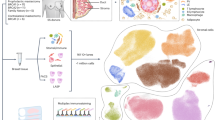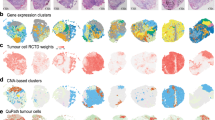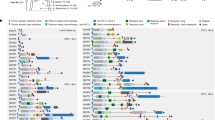Abstract
The p16 protein plays an important role in the transition of cells into the G1 phase of the cell cycle. We have studied the prevalence of p16 protein expression in breast carcinomas in a prospective series of 368 invasive and 52 non-invasive malignancies, as well as in 88 locally recurring tumours and three tumour cell lines. p16 protein expression was evaluated immunohistochemically on paraffin sections using monoclonal and polyclonal anti-p16 antibodies, and by immunoblotting of tumour cell suspensions. Tumour cell lines were also subjected to polymerase chain reaction-single strand polymorphism (PCR-SSCP) analysis and direct DNA sequencing. The results were compared with established prognostic parameters, DNA flow cytometry and p53 protein expression. In 33 (9%) invasive and two (4%) intraductal carcinomas, a cytoplasmic accumulation of the p16 protein was seen. These cases were characterized by poor histological grade of differentiation, loss of of oestrogen receptors and progesterone receptors and frequent overexpression of the p53 protein. In addition, breast carcinomas with aberrant p16 expression demonstrated a high proliferative activity, with median S-phase fractions 74% higher than in the control group and the median Ki67 fractions elevated to 75%. A genetic alteration of the p16 gene was not detectable in three analysed cell lines with cytoplasmic p16 expression applying PCR-SSCP and direct DNA sequencing. These results indicate that cytoplasmic accumulation of the p16 protein identifies a subset of highly malignant breast carcinomas with accelerated tumour proliferation and other unfavourable parameters in breast cancer. The described protein accumulation is apparently not caused by an alteration of the p16 gene.
This is a preview of subscription content, access via your institution
Access options
Subscribe to this journal
Receive 24 print issues and online access
$259.00 per year
only $10.79 per issue
Buy this article
- Purchase on Springer Link
- Instant access to full article PDF
Prices may be subject to local taxes which are calculated during checkout
Similar content being viewed by others
Author information
Authors and Affiliations
Rights and permissions
About this article
Cite this article
Emig, R., Magener, A., Ehemann, V. et al. Aberrant cytoplasmic expression of the p16 protein in breast cancer is associated with accelerated tumour proliferation. Br J Cancer 78, 1661–1668 (1998). https://doi.org/10.1038/bjc.1998.739
Issue Date:
DOI: https://doi.org/10.1038/bjc.1998.739
This article is cited by
-
Disentangling the aneuploidy and senescence paradoxes: a study of triploid breast cancers non-responsive to neoadjuvant therapy
Histochemistry and Cell Biology (2016)
-
Co-expression of p16 and p53 characterizes aggressive subtypes of ductal intraepithelial neoplasia
Virchows Archiv (2016)
-
Prognostic value of tumor suppressors in osteosarcoma before and after neoadjuvant chemotherapy
BMC Cancer (2015)
-
Equivocal p16 Immunostaining in Squamous Cell Carcinoma of the Head and Neck: Staining Patterns are Suggestive of HPV Status
Head and Neck Pathology (2012)
-
Gastrin inhibits a novel, pathological colon cancer signaling pathway involving EGR1, AE2, and P-ERK
Journal of Molecular Medicine (2012)



